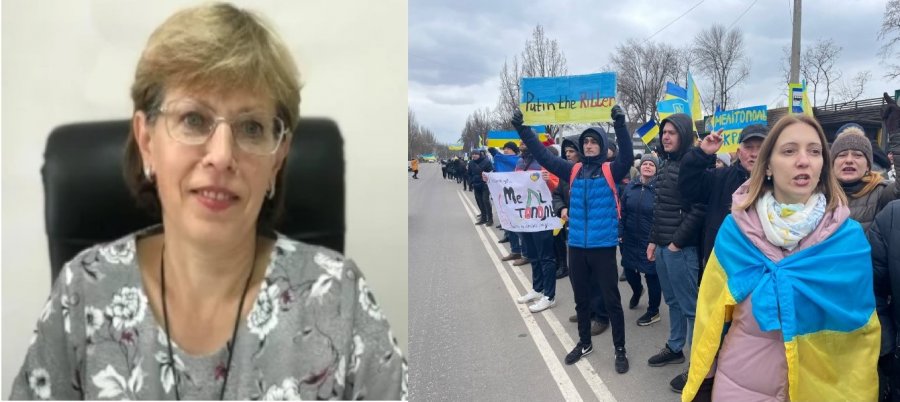Russia uses terror and abduction in attempt to force schools to collaborate in occupied Melitopol

The attempt by the Russian invaders and local collaborators to get five kindergartens running in Melitopol (Zaporizhzhia oblast) has yet again demonstrated the resistance shown by residents of the city, one of the first to be seized after Russia’s total invasion of Ukraine on 24 February. Despite abducting Iryna Shcherbak, Head of the Melitopol Department of Education and four school directors, the Russians have had minimal success in foisting a Russian syllabus or even in persuading parents to send their children to ‘schools’ under the invaders’ control.
Having swiftly understood that they would not receive any support from the democratically elected Mayor of Melitopol , Ivan Fedorov, the Russians abducted him on 11 March, and installed at gunpoint a collaborator, Halyna Danylchenko as so-called ‘acting mayor’. Fedorov was later released in an exchange of prisoners and remains Mayor, but from government-controlled territory.
The invaders, helped by Danylchenko, began trying to foist a ‘Russian program’ and teaching in Russian onto schools in Melitopol, but encountered strong resistance. They reacted, as always, with terror. On 28 March, they abducted Iryna Shcherbak, Head of the Department of Education within the City Council, after she refused to collaborate with the Russians and restart schools under a Russian syllabus. Fedorov first reported her abduction, saying that the Russian invaders had fabricated some kind of ‘charges’ against her, of supposed ‘embezzlement’. In fact, Shcherbak is one of many victims of Russian enforced disappearances, and well over a month after her abduction, there is no information about her whereabouts.
Shcherbak was by no means the only educationalist who refused to collaborate with the Russians. Although ‘only’ four school directors were also abducted, essentially none of the heads of the 21 schools in the city agreed to collaborate. Angelina Kovalenko, the Director of School No. 4, has recounted the background and circumstances around her abduction. Kovalenko was among many Melitopol residents who came out in protest after Fedorov’s abduction.
At the end of March, the Russians went around schools, trying to get the heads to attend a ‘meeting on organizing education’. Nobody attended, so the Russians turned up at the directors’ offices again, trying to get them to collaborate.
Yet again, not one of the directors agreed. Some of them met at Kovalenko’s school and agreed together how to obstruct the invaders from restarting schools. Kovalenko stresses that they were not in a position to guarantee the children’s safety, and they understood that at any moment, the children could become hostages. In reporting the abduction of three directors, Liudmyla Denisova, Ukraine’s Human Rights Ombudsperson pointed out also that the children were effectively being used as human shields, obstructing the Ukrainian Armed Forces from launching an offensive against the invaders.
One school director had recently died, and another two had left Melitopol. The other 18 all wrote letters of resignation. Fake ‘mayor’ Danylchenko, flanked by armed Russians, reacted with fury and foul language, but the directors all stood firm.
The Russians came for four of them that day: Angelina Kovalenko; Liudmyla Chuhai; Margarita Ovsiannykova and Olena Halatsan. They were all taken to a cold garage, where they found Inna Morozovska, the mother of an ATO fighter (one of the Ukrainian defenders during the first years of the war in Donbas). She had been seized several days earlier, most likely because of her son. She was not released with the others, and her whereabouts also remain unknown.
The conditions that the women were held in were appalling, and, although they were spared the torture that a man in a neighbouring garage was subjected to, there were obvious attempts to terrorize them. The four school directors were finally told they were being ‘deported’ for “sabotaging the educational process” and for opposition to the Russian occupation regime. They were blindfolded and, understandably, wondered whether they were being taken to the Russian proxy ‘Donetsk people’s republic’ or to be shot. In fact, they were simply left on a road. They made their way back to Melitopol, but three, including Kovalenko, have since left for areas safety under Ukrainian government control.
Fake certificates and empty classrooms
It was reported on 21 April that the Russians and their collaborators were trying to intimidate parents, threatening that their children would have to repeat a year if they didn’t return to school, and promising to issue supposed ‘certificates’. The lies were immediately refuted by Mayor Fedorov. He also stressed that the Russians were using children as human shields and reminded any teachers thinking of working under the occupiers that Ukraine’s recently-passed law on collaborators will be applied to them. It was clear that parents were aware of the dangers, and less than eager to send their children to school. On 3 May, RIA-Melitopol reported that parents are frightened to send their children to kindergartens to those collaborating with the Russians. Although the collaborators planned to launch five kindergartens on 2 May, there was scarcely any demand Instead of the pre-war 150 to 170 children, there were at most 12-20.
The publication cited some of the comments they had found on social media, outraged at the prospect of their children becoming hostages, and having the orcs [Tolkien’s term is standardly used for the Russian invaders] stuff their children’s heads full of “all kinds of nonsense about them coming to liberate them”.





